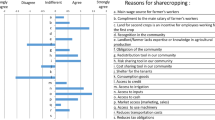Abstract
It is investigated under what conditions rents can be won through interference in the market through price subsidies. It is shown that owners of factors of production have an interest in price subsidies in the product market (which they can motivate with reference to “consumer interests”) only if the factor supply is not perfectly price elastic, the incentive for rent-seeking increasing as the price elasticity of supply decreases. It is further demonstrated that this can occur in the case of differential rents. Since differential rents are found primarily in the use of land, land owners, i.e. farmers, should have especially high incentives to engage in rent-seeking activities.

Similar content being viewed by others
Notes
See, for instance, Wickström (1993).
This can easily be motivated with reference to “consumer interests”, since the consumers of the good will profit from the subsidy, as long as they do not pay the fiscal costs financing the subsidy.
This function describes the interaction between the lobbying group and the government agencies deciding on price subsidies. This is not further modeled here; we simply assume that this interaction is well established, and can be described by a (differentiable) well-defined function.
In the case of many rent-seekers, one can assume that each rent-seeker follows a Nash strategy leading to a Nash equilibrium in rent-seeking efforts. The rent seekers will then, for each factor, maximize the corresponding value of \(\pi\) as given by Eq. 5 under the assumption that the other t’s are given. The optimal value of each t would consequently be a function of all the other t’s. Since we are here focusing on the source of the rent, we neglect the competition between the rent-seekers.
References
Blaug, M. (1968). Economic theory in retrospect. Richard D. Irwin, Inc.
Buchanan, J. M., Tollison, R., & Tullock, G. (Eds.). (1980). Toward a theory of the rent-seeking society. Texas A & M University Press.
Congleton, R. D., Hillman, A. L., & Konrad, K. A. (Eds.). (2008). 40 years of research on rent seeking 1: Theory of rent seeking. Springer.
Congleton, R. D., Hillman, A. L., & Konrad, K. A. (Eds.). (2008). 40 years of research on rent seeking 2: Applications: Rent seeking in practice. Springer.
Congleton, R. D., Hillman, A. L., & Konrad, K. A. (2008). Forty years of research on rent seeking: An overview. In R. D. Congleton, A. L. Hillman, & K. A. Konrad (Eds.), 40 years of research on rent seeking 1: Theory of rent seeking (pp. 1–44). Springer.
Olson, M. Jr (1965). The logic of collective action: Public goods and the theory of groups. No. 124 in Harvard economic studies, Harvard University Press.
Rowley, C. K., Tollison, R., & Tullock, G. (Eds.). (1988). The political economy of rent-seeking. Kluwer Academic Publishers.
Tullock, G. (1980). Efficient rent seeking. In J. M. Buchanan, R. Tollison, & G. Tullock (Eds.), Toward a theory of the rent-seeking society (pp. 97–112). Texas A & M University Press.
Wickström, B.-A. (1990). Decentralization and pressure-group activities. In R. Quandt & D. Tříska (Eds.), Optimal decisions in markets and planned economies (pp. 189–196). Westview Press.
Wickström, B.-A. (1993). Rent-seeking in different political environments. In P. Andersen, V. Jensen, & J. Birk Mortensen (Eds.), Governance by legal and economic measures, G (pp. 11–32). E. C.
Acknowledgements
I thank an anonymous referee of this journal for very constructive comments on the first version of this essay.
Author information
Authors and Affiliations
Corresponding author
Ethics declarations
Conflict of interest
The author declares that he has no conflict of interest.
Additional information
Publisher's Note
Springer Nature remains neutral with regard to jurisdictional claims in published maps and institutional affiliations.
Rights and permissions
Springer Nature or its licensor (e.g. a society or other partner) holds exclusive rights to this article under a publishing agreement with the author(s) or other rightsholder(s); author self-archiving of the accepted manuscript version of this article is solely governed by the terms of such publishing agreement and applicable law.
About this article
Cite this article
Wickström, BA. Ricardo and the farmers. Const Polit Econ 35, 141–149 (2024). https://doi.org/10.1007/s10602-023-09404-1
Accepted:
Published:
Issue Date:
DOI: https://doi.org/10.1007/s10602-023-09404-1




